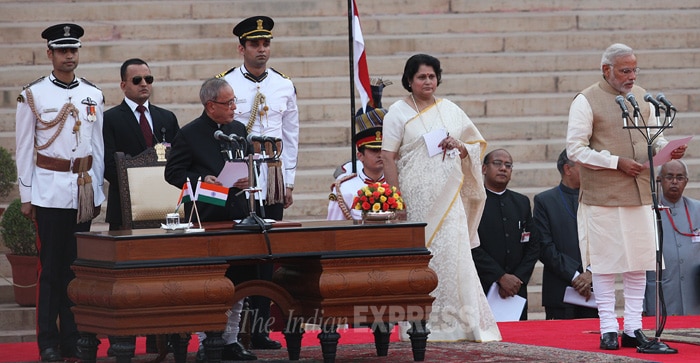Change and continuity
by AKEEL BILGRAMI
 Marking the beginning of a new era in Indian politics, Narendra Modi was sworn in Prime Minister on Monday (May 26) at the Rashtrapati Bhawan in New Delhi. PHOTO/Neeraj Priyadarshi/The Indian Express
Marking the beginning of a new era in Indian politics, Narendra Modi was sworn in Prime Minister on Monday (May 26) at the Rashtrapati Bhawan in New Delhi. PHOTO/Neeraj Priyadarshi/The Indian Express
In the Europe of the 1930s and 1940s, the term “fascist” came to be associated with two defining features. First, the finding of an external enemy within a nation (in the case of Germany, the Jews, the gypsies) and despising and subjugating them. Second, what Mussolini offered as an explicit definition of fascism: the fusion of the interests of corporations and the state. I ask the reader to look at Mr. Modi’s record with Muslims and his avowed economic programme and decide for herself where the lack of intelligence really lies.
The Hindu for more
‘Now, we have a democratically elected totalitarian government’ — Arundhati Roy
by TAHIR MEHDI
“Now, we have a democratically elected totalitarian government,” she continues. “Technically and legally, there is no party with enough seats to constitute an opposition. But many of us have maintained for several years that there never was a real opposition. The two main parties agreed on most policies, and each had the skeleton of a mass pogrom against a minority community in its cupboard. So now, it’s all out in the open. The system lies exposed.”
Dawn for more
Many Waves and a Media Tsunami
by P. SAINATH
As the Association for Democratic Reforms points out: In 2014, “82 per cent of all the winners are crorepatis.” Also, the ADR reckons : “The chances of winning for a crorepati candidate” were at least ten times greater those of candidates with less than a crore of rupees in assets. Fittingly, we’ve got a parliament with 442 crorepatis. That is, fully 82 per cent of members in the new Lok Sabha are people with assets of ten million rupees or more. Massively up from 58 per cent in 2009.
In 2014 the average asset worth of each winner, ADR says, was Rs.14.61 crores. That’s 173 per cent higher than the 2009 winner average of Rs. 5.35 crores. But average citizens have simply been priced out of the game. Can they ever afford to contest?
P. Sainath for more
via News Click
Narendra Modi and the new face of India
by PANKAJ MISHRA
Modi is a lifelong member of the Rashtriya Swayamsevak Sangh (RSS), a paramilitary Hindu nationalist organisation inspired by the fascist movements of Europe, whose founder’s belief that Nazi Germany had manifested “race pride at its highest” by purging the Jews is by no means unexceptional among the votaries of Hindutva, or “Hinduness”. In 1948, a former member of the RSS murdered Gandhi for being too soft on Muslims. The outfit, traditionally dominated by upper-caste Hindus, has led many vicious assaults on minorities. A notorious executioner of dozens of Muslims in Gujarat in 2002 crowed that he had slashed open with his sword the womb of a heavily pregnant woman and extracted her foetus. Modi himself described the relief camps housing tens of thousands of displaced Muslims as “child-breeding centres”.
The Guardian for more
India-Pakistan tensions remain high, despite Modi’s meeting with Sharif
by SAMPATH PERERA and KEITH JONES
Large sections of India’s corporate elite and military security establishment are pressing for India’s new government to further strengthen India’s alliances with US and Japanese imperialism as a means of bridging the “strategic gap” between India and China.
Such a development would only further exacerbate Islamabad’s fears. Moreover, with Pakistan likely to respond by trying to deepen its “all-weather alliance” with China, it could lead to the US-China and Indo-Pakistani conflicts becoming intertwined, adding a highly explosive new dimension to both.
World Socialist Web Site for more
Gujarat 2002, India 2014: ‘Numbers Sanctify’
by BERNARD D’MELLO
Basically, in this national election to India’s 16th Lok Sabha, the BJP’s money has beaten the Congress’s money. According to the Hindustan Times (April 13, 2014), going by the estimate of “media buyers and sources close to the BJP’s campaign”, the party was supposed to end up spending about Rs 50,000 million on all media — print, television, outdoor, Internet and radio — “to block out all other political parties”. A former Chief Operating Officer of Rediffusion Y&R, a media buying agency, is quoted as saying that “The BJP’s spending is at least four times that of the Congress”. Add to the Rs 50,000 million media-spend all the other election-related expenses of the BJP, especially those on private aircraft and helicopters, and the figure would exceed what Barack Obama spent on his presidential campaign, according to Siddharth Varadarajan, former editor of the The Hindu newspaper. Surely all this has influenced the electoral outcome, and, more ominously, will sway the policies of the BJP-led government that will soon be sworn into office, not to forget the adverse effects on the character and integrity of Indian democracy itself. After all, isn’t it wealth that has influenced the election results to gain political power and establish its control over the government that will soon come into office?
Monthly Review Zine for more
